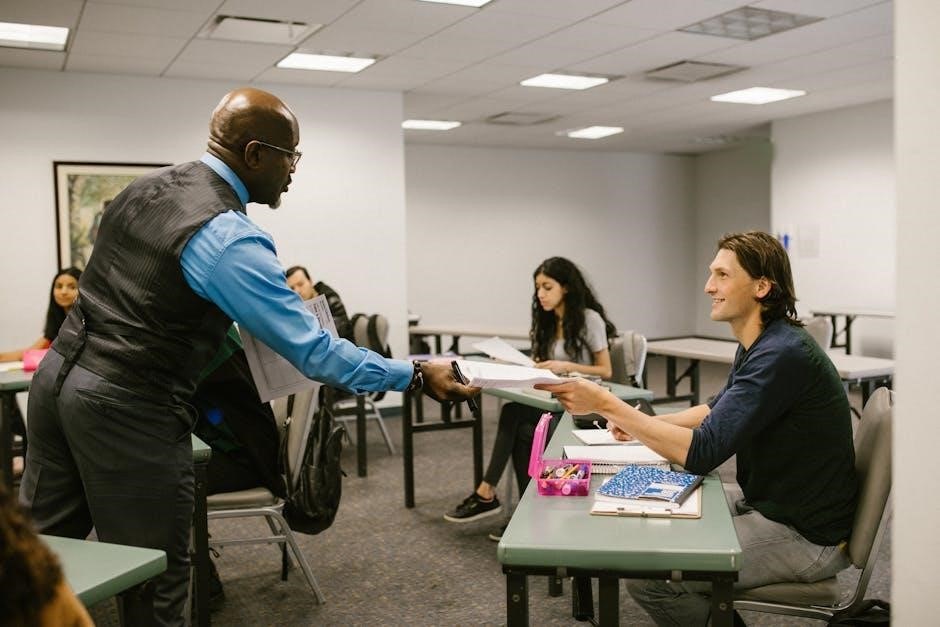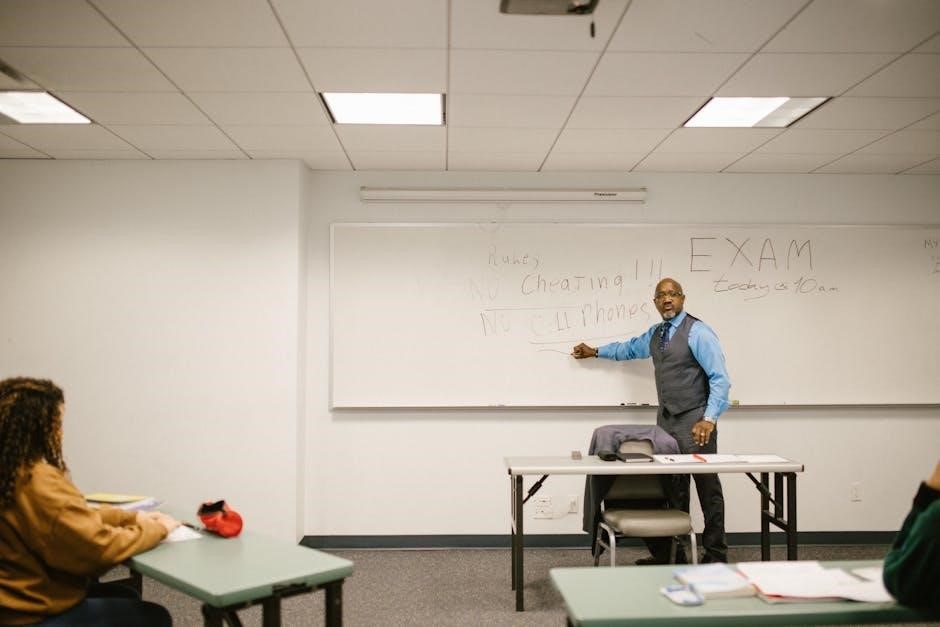General Regulations for Conducting Examinations 2024
The JCQ has updated its guidelines for 2024‚ emphasizing exam security‚ integrity‚ and fairness. Key changes include enhanced training requirements‚ stricter malpractice measures‚ and updated invigilation protocols to ensure consistency across all centers.
1.1 Key Updates and Changes for 2024
The JCQ has introduced enhanced digital security measures‚ updated invigilation protocols‚ and new procedures for managing technical issues during exams. Additionally‚ there are revised guidelines for accommodating candidates with special needs and updated training requirements for exam officers to ensure compliance with the latest regulations.
1.2 JCQ Guidelines and Instructions
JCQ guidelines outline strict protocols for exam administration‚ including secure storage of materials‚ candidate verification processes‚ and clear invigilation practices. Centers must adhere to these instructions to maintain exam integrity and ensure fairness. Regular updates and training are required to comply with the latest JCQ directives for the 2024 examination cycle.

Roles and Responsibilities
Exam officers‚ invigilators‚ and heads of centre play crucial roles in ensuring exams run smoothly. Their duties include maintaining integrity‚ providing support‚ and adhering to JCQ guidelines for fair assessment.
2.1 Exam Officers and Their Duties
Exam officers are responsible for coordinating all exam processes‚ ensuring compliance with JCQ guidelines. They manage venue setups‚ invigilation schedules‚ and candidate registrations. Duties include handling exam materials‚ addressing queries‚ and resolving issues. They ensure fairness‚ security‚ and confidentiality‚ liaising with heads of centre to maintain exam integrity and provide necessary support to candidates and staff throughout the examination period.
2.2 Invigilators: Training and Responsibilities
Invigilators are crucial in maintaining exam integrity. They undergo training to understand JCQ guidelines‚ ensuring exams are conducted fairly and securely. Responsibilities include verifying candidate identities‚ distributing materials‚ monitoring behavior‚ and preventing malpractice. They must remain vigilant‚ handle irregularities promptly‚ and ensure a quiet‚ fair environment. Training emphasizes adherence to protocols‚ effective communication‚ and post-exam procedures to uphold exam standards and integrity.
2.3 Heads of Centre: Oversight and Accountability
Heads of Centre are responsible for ensuring compliance with JCQ regulations and maintaining exam integrity. They oversee all aspects of exam administration‚ including staff training‚ resource management‚ and security protocols. Accountability extends to resolving conflicts‚ addressing irregularities‚ and ensuring fair treatment of all candidates. Their role is pivotal in upholding the standards and integrity of the examination process at their centres.

Pre-Examination Preparations
Centres must ensure accurate timetabling‚ staff training‚ and secure storage of materials. Equipment checks and candidate registration processes are critical to ensure smooth exam operations and compliance with JCQ guidelines.
3.1 Timetabling and Scheduling
Centres must create accurate timetables‚ ensuring exams are scheduled without overlap. Dates and times must align with JCQ guidelines‚ considering candidate availability and room allocations. Timetables should be shared with candidates and staff in advance‚ with contingency plans for unforeseen disruptions‚ ensuring minimal impact on the examination process and candidate experience.
3.2 Venue Setup and Equipment Checks
Centres must ensure venues meet JCQ standards‚ with adequate seating‚ desks‚ and lighting. Equipment‚ including audio systems for MFL exams‚ must be tested beforehand. Invigilators should verify that all materials are secure and accessible. Detailed seating plans must be prepared‚ ensuring candidate accessibility and compliance with JCQ guidelines to maintain exam integrity and fairness.

Exam Day Procedures
Candidates must be registered and verified before exams. Invigilators ensure adherence to JCQ guidelines‚ manage timings‚ and maintain a secure environment to uphold exam integrity and fairness.
4.1 Candidate Registration and Verification
Centers must ensure all candidates are registered and verified before exams. This includes checking identification‚ confirming eligibility‚ and updating records. Accurate attendance lists and seat plans are essential. Invigilators must verify candidate details to prevent impersonation and maintain exam integrity‚ following JCQ guidelines strictly. Any discrepancies should be reported immediately to avoid complications during the examination process.
4.2 Invigilation Best Practices
Invigilators must ensure a fair and secure exam environment. They should conduct pre-exam checks‚ monitor candidates closely‚ and prevent unauthorized materials. Maintaining silence‚ addressing disruptions promptly‚ and following JCQ guidelines are crucial. Invigilators should also be trained to handle emergencies and report irregularities‚ ensuring the integrity of the examination process while adhering to all safety and conduct protocols.
4.3 Managing Exam Timings and Duration
Accurate timing is crucial for fair exams. Invigilators must start on time‚ announce start and end clearly‚ and monitor clocks. Ensure all candidates have the correct duration‚ with extra time for special needs. After time is up‚ collect papers promptly to maintain security and avoid disruptions‚ ensuring all candidates are treated fairly and equally.

Security and Integrity Measures
Secure storage of materials is vital to prevent malpractice. Strict protocols must be followed to ensure exam integrity‚ maintaining fairness and preventing cheating throughout the process.
5.1 Preventing Malpractice and Cheating
Strict protocols must be implemented to prevent malpractice‚ including secure storage of materials‚ clear communication of rules‚ and active invigilation. Candidates must be informed of consequences of cheating‚ and staff should be trained to identify and address irregularities promptly‚ ensuring a fair environment for all participants.
5.2 Secure Storage of Exam Materials
Exam materials must be stored securely in locked‚ tamper-evident bags or containers. Access should be restricted to authorized personnel only‚ with clear logging of storage and retrieval. Centers must ensure materials are not left unattended and are protected from unauthorized access to maintain exam integrity and prevent breaches.

Special Arrangements and Accommodations
Centers must provide reasonable adjustments for candidates with special needs‚ including access arrangements and assistive technologies. External candidates must receive equal support.
6.1 Supporting Candidates with Special Needs
Centers must provide reasonable adjustments for candidates with special needs‚ ensuring equal access to exams. This includes access arrangements‚ assistive technologies‚ and extra time where required. Support plans should be documented and communicated clearly to invigilators. All adjustments must comply with JCQ guidelines to maintain fairness and consistency across all examination settings effectively.
6.2 Arrangements for External Candidates
Centers must ensure external candidates have proper arrangements in place‚ including verification of identity and provision of necessary materials. A secure‚ quiet environment must be maintained‚ with access to required resources; All arrangements should comply with JCQ guidelines to ensure fairness and integrity‚ maintaining the same standards as for internal candidates.

Handling Unforeseen Circumstances
Centers must have contingency plans for disruptions‚ including emergencies or technical issues. Irregularities must be reported immediately‚ ensuring minimal impact on candidates and exam integrity.
7.1 Contingency Plans for Disruptions
Examination centers must develop robust contingency plans to address disruptions‚ such as emergencies‚ technical failures‚ or unforeseen events. Plans should include clear communication strategies‚ alternative arrangements‚ and procedures for minimizing delays. Regular drills and staff training are essential to ensure preparedness. Centers must also maintain incident logs and report disruptions to JCQ promptly‚ ensuring the integrity of the examination process is upheld.
7.2 Reporting and Managing Irregularities
Any irregularities during exams must be reported immediately to the JCQ. Centers should document incidents thoroughly‚ including evidence and witness statements. Irregularities include malpractice‚ disruptions‚ or breaches of security. Swift action ensures fairness and integrity. Consequences may include penalties for candidates or centers. Clear procedures for reporting and managing irregularities are outlined in the JCQ guidelines to maintain exam standards and accountability.

Post-Examination Procedures
Post-examination procedures include secure storage of materials‚ collecting and storing exam scripts‚ and reviewing results. Centers must follow JCQ guidelines to ensure integrity and compliance.
8.1 Collecting and Storing Exam Scripts
After exams‚ scripts must be collected promptly and stored securely in tamper-evident bags. Scripts should be labeled clearly‚ sealed‚ and stored in a locked‚ accessible-only area. Centers must ensure scripts are protected from unauthorized access‚ following JCQ guidelines to maintain confidentiality and integrity until results are finalized and scripts are returned or archived.
8.2 Reviewing and Releasing Results
Centers must verify exam results for accuracy before release‚ ensuring no discrepancies or malpractice. Results should be shared with candidates securely‚ adhering to JCQ timelines. Any queries or appeals must be addressed promptly‚ with clear documentation. Results are released officially after final verification‚ maintaining confidentiality and fairness throughout the process to uphold the integrity of the examination system.

Important Documents and Resources
Essential documents include the JCQ Instructions for Conducting Examinations 2024 PDF‚ additional guidelines‚ and specific forms for exams‚ assessments‚ and malpractice prevention‚ all available on the JCQ website.
9.1 JCQ Instructions for Conducting Examinations 2024 PDF
The JCQ’s 2024 PDF guide provides comprehensive instructions for conducting exams‚ covering key updates‚ security measures‚ and best practices. It ensures consistency and fairness‚ with highlighted changes from previous versions for easy reference‚ making it a vital resource for exam officers and centers.
9.2 Additional Guidelines and Forms
Supplementary resources include detailed forms‚ templates‚ and annexes to support exam administration. These materials cover specific scenarios‚ such as invigilation scripts‚ candidate warnings‚ and contingency plans. Additional guidelines provide clarity on practical exams‚ coursework submissions‚ and special accommodations‚ ensuring thorough preparation and compliance with JCQ standards for a smooth examination process.

Training and Support
Training programs and resources are available to ensure staff are well-prepared for exam administration. JCQ provides regular updates‚ webinars‚ and detailed guides to support exam centers effectively.
10.1 Staff Training Requirements
All exam staff must undergo mandatory training to understand JCQ guidelines‚ ensuring compliance with security protocols and fair examination practices. Training covers roles‚ responsibilities‚ and updated procedures for conducting exams effectively. Centers must maintain records of completed training for accountability and audit purposes. Regular updates and refresher courses are recommended to stay informed about the latest changes.
10.2 Accessing JCQ Resources and Updates
The JCQ provides comprehensive resources‚ including PDF guides and webinars‚ to support exam centers. Regular updates are available on their website‚ ensuring staff stay informed about the latest changes. Centers are encouraged to subscribe to JCQ notifications for timely access to new guidelines‚ forms‚ and best practices for conducting examinations effectively and securely.
